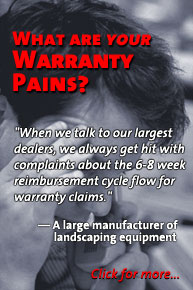February 24, 2003 |
ISSN 1550-9214 |
Extended Warranty Deception:Two companies misuse the power of the Web to set their bait for unsuspecting auto warranty shoppersby Eric Arnum, Editor
By all accounts, the market for automobile extended warranties is hotly contested, with everyone in search of a competitive advantage over their peers. But at least one company and one of its affiliates have gone way above and beyond the call of duty, creating a web of deceptive content, false claims, misleading addresses, and misused trademarks designed to ensnare innocent World Wide Web users in search of honest advice. WarrantyByNet Inc. of Brick NJ is the company, and KayeTech Systems of Apopka FL is the affiliate. At least we assume it is an affiliate. Last week, when Warranty Week asked Evan Gartenberg, WarrantyByNet's director of business development, whether he was aware of what KayeTech Systems and/or its owner David Kaye were doing in his company's name, he replied, "I don't really know anything about those." Was there any contractual relationship between David Kaye and WarrantyByNet? "Not as far as I know," Gartenberg asserted, although he conceded there might be something going on that he didn't know about. "I'm just one person here. So I don't know who does what here. I could check. I don't know everything here." He then suddenly remembered he was late for a meeting, and promised to call us back soon with the correct information. We're still waiting. Efforts to elicit comment from David Kaye proved to be equally unproductive. His company has a Web site that avoids using his name, provides no contact phone or fax numbers, and includes just one email address: makeit@mailshell.com. Messages to that address and others such as postmaster@kayetech.com finally produced a response in the form of a short email: "I�m just curious why you�re asking questions about my affiliate relationship with WarrantyByNet?" That's as close as we've come so far to a confirmation that indeed these people do know each other. However, if a late-arriving response does appear, we'll splice it right here into the online edition of this article, which will remain posted at www.warrantyweek.com/newsarchive/ww20030224.html. Deceptive URLs & KeywordsWhat KayeTech and WarrantyByNet have done is to each create a family of identical and interwoven Web pages that ensnare the Web user through their clever use of keywords in the page's address, also known as the URL. WarrantyByNet's family of 12 pages each combine the make of an automobile with the word warranty, as in audiwarranty or fordwarranty. What's on each page is some copy designed to entice the reader into offering personal information in return for a free rate quote. KayeTech's family of 20 sites uses permutations of the words auto, extended, and warranty. Then KayeTech takes a few extra steps by including false statements and unsupported claims designed to deceive the reader, plus a long list of keywords and invisible links designed to deceive a search engine. Briefly, what we've found can be grouped into five topic headings:
Kaye's automotive advice sites include:
Auto Extended Warranty .org Automobile Extended Warranties .com Automobile Extended Warranty .net Automobile Warranties .net Automobile Warranty .org Auto Warranties .org Car Extended Warranty .net Extended Automobile Warranties .net Extended Auto Warranties .net Extended Auto Warranty .org Extended Car Warranties .net Extended Car Warranty .net Extended Vehicle Warranties .com Extended Waranties .com Extended Warrantys .com Extended Warranties .org Extended Warranty .org Used Car Warranties .net WarrentyByNet .com WarrantyByNet's mirror sites include:
BMWwarranty.net Buickwarranty.net Cadillacwarranty.net Chevroletwarranty.net Chryslerwarranty.net Fordwarranty.net Hyundaiwarranty.net Mercedeswarranty.net Mercurywarranty.net Toyotawarranty.net Volvowarranty.net Note that one of Kaye's registrations, for "warrentybynet.com," includes a deliberately misspelled word -- it's a so-called "typosquatting" site that mirrors the legitimate WarrantyByNet.com home page. Another of his sites, Auto Buyers Advice .com , actually advertises the services of Warranty Direct -- one of WarrantyByNet's direct competitors. Nothing Illegal AllegedLet's make one thing clear. Nothing we've been told suggests any criminal behavior by anyone involved. We're not sure that anything these companies have done online would be of any interest to either law enforcement authorities, market regulators, or consumer advocates. In fact, the Better Business Bureau and others say that WarrantyByNet has a satisfactory rating, and nobody has told us there is any problem at all with claims payments. However, we're certain that some of the owners of these registered trademarks and reputable brands will take exception to how their valuable and famous names have been used for the commercial gain of KayeTech Systems and WarrantyByNet. We'll tackle these five points in order: 1) KayeTech's pages include outdated A.M. Best ratingsWarrantyByNet said their reinsurance underwriter is the American Re-Insurance Company, the principal operating subsidiary of the American Re Corp. That company has a legacy that goes back to at least 1917. Its German parent company, Munich Re, goes back more than 120 years. Moody's gives American Re an Aa2 rating, and Standard & Poor's gives it an AA-. A.M. Best gives it an A+ rating. Those are high marks by anyone's standards. However, for years A.M. Best had given American Re an A++ rating, until it was downgraded one notch on Dec. 6, 2002. You can read all about the downgrade on American Re's site, although it's not strictly relevant to this discussion. What is relevant is that Kaye's 20 advice sites, which were posted in late 2001, still contain the old rating. And they don't do so casually in the fine print. They feature the name A.M. Best and the rating A++ as proof of WarrantyByNet's financial stability. In contrast, WarrantyByNet's home page includes the most recent (and correct) rating. However, it merely states "A+ (Superior) Rated by A.M. Best & Co.," without any clear indication of who or what was rated. We suspect we're expected to jump to the conclusion that WarrantyByNet is rated A+, although the company information page provides details that make it clear that it's the reinsurance underwriter that's rated A+. Not the First Time"We've had issues like this before," noted A.M. Best's Sheila Penn. She said there is only a slight difference between an A+ and an A++ rating, and in fact both are considered superior ratings. But that's not the point. Almost three months ago, the rating changed. In the interim, WarrantyByNet has found the time to correct all of its pages while KayeTech Systems has not corrected any of its pages. "What they have up there is false advertising," Penn said. "It is deceiving the consumer. No matter what, someone somewhere has control over that page, and needs to take it down and make it right. Otherwise, we could file a lawsuit against them for misrepresenting our company." Penn said A.M. Best has an office of intellectual management, whose job it is to make sure anyone who quotes the company does so accurately. "We don't want to misrepresent anything, and we don't ourselves want to be misrepresented either," she said. "Whenever we find anything like this out, we try to take care of it as soon as possible, because we know that people rely on our good name and our readings as well. That could make a difference between you going with one company or another. And we don't like anyone to falsely represent anything involving us, our name, or our readings." 2) Possible exaggerations or unsupported claimsBesides the A.M. Best rating, about the only other material fact that KayeTech Systems clearly gets wrong is the notion that WarrantyByNet's expertise "was gained and perfected long before the existence of the Internet." According to the Better Business Bureau, WarrantyByNet opened in March 1999 and its parent company Automobile Protection Plan Inc. opened in May 1994. The Internet has existed in some form since at least 1969, and the protocols that drive the World Wide Web were invented in 1989. By May of 1994, there were already more than 20,000 Class C networks and three million hosts on the Internet. There are numerous other marketing claims made on KayeTech Systems' pages that are harder to dispute. For instance, how can anybody verify that WarrantyByNet employs "knowledgeable, experienced and friendly consultants," as Kaye's advice pages claim? He also calls WarrantyByNet "one of the largest and most solidly backed extended warranty companies on the Internet" and "one of the most financially sound auto warranty companies in the marketplace." Compared to what? One could argue endlessly over the meaning of the phrase "one of," or one could just move on. Likewise, phrases that attribute "more competitive" prices and "superior customer service" to WarrantyByNet are unlikely to be mistaken as facts. Instead, most readers will see them for what they are: as comparative assertions and marketing boasts that may or may not be true. We asked Kaye by email how he arrived at these advertising claims and whether he or some third party performed the research upon which they were based. We're still waiting for an answer. 3) These are "advisortisements," advertisements posing as adviceTune in to some of the programming on late-night television and you might drop in on the middle of an "infomercial," which blends the advertising content of a commercial with the informational content of a news program or talk show. In some respects, this is what Kaye's pages do: they blend advertisements with information. However, all of Kaye's pages are labeled in the top left corner as "Auto Buying Advice," and he signed his email with the tag, "President, Auto Buyers Advice." In other words, he is representing himself as an expert, and his pages as expert opinions. The infomercials promise cleaner clothes or shinier wax. They don't typically offer advice. So we're coining a new term to describe this family of advice/advertisement pages: "advisortisements." They are advertisements posing as advice columns. And of course, their advice is to buy an extended warranty from WarrantyByNet. Live BaitOne market expert likened these pages to lobster traps or spider webs. They are designed to ensnare the user and drive them towards a Web form, into which they must enter their personal information in return for a free rate quote. It's called online marketing. Give something to get something. Everybody does it, to some extent. That KayeTech and WarrantyByNet do it better is something for which they should be congratulated, not criticized. However, in our opinion, if everybody else is setting out a lobster trap or two, these guys are using great big tuna nets. Nobody else to our knowledge has a fleet of a dozen mirror sites and 20 cross-linked advice columns that so cleverly use the intricacies of the Web to their own advantage. In fact, we can't find anybody with even half as many. These guys are in first place and everyone else is tied for second. By no means are these the only pages on the Internet that offer free advice about automobiles or free quotes for extended warranties. There are other non-KayeTech Systems pages that also recommend WarrantyByNet exclusively, and there are other pages that use one ruse or another to ensnare the reader in another vendor's net. There are affiliate relationships, paid links, and referral programs all over the industry. But nobody does it as well as KayeTech and WarrantyByNet. There are also lots of lists of extended warranty vendors. There are alphabetical lists and there are link collections that follow their own peculiar rules of alphabetization. There are some that list their favorites up top and the rest below. No doubt, money changes hands to move all those "W" companies that ordinarily would be listed towards the bottom up to the top. And then there is the rare site that actually offers in-depth information, blended with a recommendation or two. For instance, almost every page of the online book "Good As New" includes a banner ad for WarrantyByNet. However, every chapter also is filled with anecdotes, tips, and advice that make it well worth reading. In instances like this, the advertising is merely paying the bills and is not, we hope, the reason the site was created. Real Advice Plus RecommendationsAnother auto advice site, called CarBuyingTips.com, sprinkles multiple vendor recommendations into its pages. Those recommendations are paid for, as author Jeff Ostroff readily acknowledges. "Everybody pays us -- and we do disclose that -- but we're going to send people to places that are going to treat them the best," he said. "Because let me tell you something: when the companies rip people off, I'm the one that hears about it." The Web site, which next month begins its seventh year online, receives about 10,000 "hits" per day, Ostroff said. He told Warranty Week that he sees himself as a "real world consumer advocate." Most consumer advocates, he said, dispense advice, highlight scams, and mediate disputes. But they usually stop short of making any endorsements. He doesn't. In the real world, someone has to pay the bills. Ostroff said he does his own research, picks a few vendors that meet his criteria in each market segment, and then he tries to recruit them as sponsors. "We always try to pick two sources that are good," he noted. In the extended warranty section -- which is just one section of several -- he picked Warranty Direct and 1SourceAutoWarranty.com as his sponsors. Sites such as KayeTech's 20 don't impress him much. They're marketing brochures that leave the reader no more knowledgeable after their visit than they were before. In contrast, Ostroff said he gets roughly 50 emails a day from visitors who made good use of his car buying advice. Some report they saved money or avoided scams. Others thank him for the confidence boost, which they feel helped them in some way with their dealer negotiations. "We have married women who say they left the husband at home and they went and bought the car themselves," he said. "When they leave our site, they are extremely educated. In most cases, they'll know more than the salesman, and they'll be able to outsmart anything the salesman throws at them." 4) Kaye is "spamdexing" the search enginesEach of Kaye's advice pages is carefully crafted to increase its ranking on the major search engines. Virtually any search term seeking information on extended warranties is going to at least partially match one of his URLs. It might match several. In fact, he's even planned for misspelled search words such as warrenty, waranty, or warrantys in his choice of URLs. In addition, each of his advice pages includes a series of keywords, listed within the HTML code in a field called a meta tag. Since meta tags are included at the top of the page in the header section, they are normally invisible to the reader. However, search engines can "see" these keywords. Indeed, they use them to help rank the relevance of a specific page to a person's search. The closer the match, the higher the ranking. In the old days, some Web page authors used to fool the search engines by endlessly repeating one word hundreds of times in order to get a better ranking. Now, the search engines have smartened up. Many now screen out pages that repeat a word or phrase more than seven times. Kaye's pages include these keywords in a meta tag: auto warranty, extended warranty, auto extended warranty, extended warranties, car warranty, automobile extended warranties, auto warranties, automobile warranties, extended auto warranty, extended car warranty, automobile extended warranty, car warranties, gm extended warranty, extended auto warranties, extended automobile warranties, used car warranty, car extended warranty, used car warranties, extended car warranties, extended vehicle warranties, ford extended warranty, chrysler warranty, warranty gold, extended vehicle warranty, ford warranty, vehicle extended warranty, vehicle warranty, warranty direct, honda warranty, extended automobile warranty, honda extended warranty, auto extended warranties, used car extended warranty, new car warranties, chrysler extended warranty, extended warranty auto, automotive warranty. (continued, above, right) | ||||||||||||||||||||||||||||||||||||||||||||||
| ||||||||||||||||||||||||||||||||||||||||||||||






